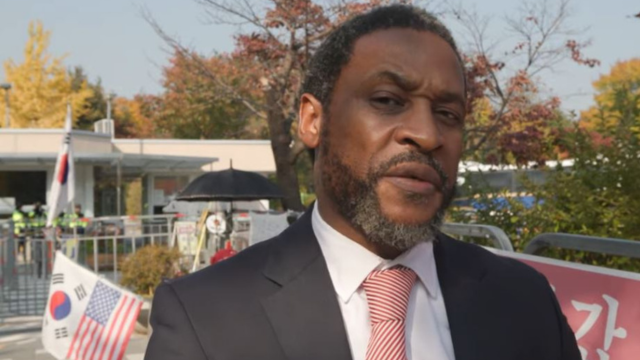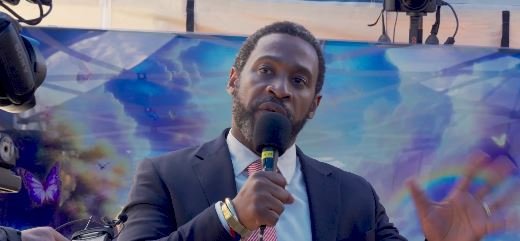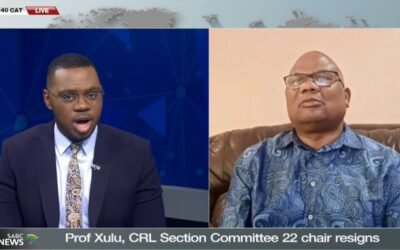The leader of The Revelation Spiritual Home traveled to Korea to meet with the detained leader of the Family Federation for World Peace and Unification.
by Massimo Introvigne

Our world is too often dulled by cynicism and fractured by political and religious controversy. Yet, some moments pierce through with the clarity of spiritual truth. One such moment unfolded in Seoul on November 4, when IMboni Samuel Radebe, the South African spiritual leader and founder of The Revelation Spiritual Home (TRSH), made an extraordinary pilgrimage to visit Dr. Hak Ja Han Moon, affectionately known as Holy Mother Han, the Mother of Peace, in the Seoul Detention Center where she is detained.
This was no ordinary visit. It was a testament of love, sacrifice, and transcendent solidarity.
IMboni Radebe—often mistakenly called “Prophet Radebe” in media reports, a misnomer that obscures the unique role of an IMboni in African Indigenous Spirituality—left behind conferences, responsibilities, and his three school-age children to fly over sixteen hours with his wife to Korea. His purpose: to stand beside a woman he calls a “true, authentic leader,” unjustly detained under what many, including scholars like me, regard as ill-founded and politically motivated charges.
As the authors of a recent book on Dr. Radebe and TRSH, published by Cambridge University Press, my wife, Rosita, and I have thoroughly studied his teachings. His message is not Christian, though he counts many Christians among his friends. It is a bold reclamation of African Indigenous Spirituality, going beyond Christianity and Islam, which he regards as colonial impositions, and restoring the original African sources. Yet, in this moment, he stood shoulder to shoulder with followers of the Unification Church (now known as the Family Federation for World Peace and Unification), defending religious liberty and honoring Mother Han’s universal mission for peace.

After meeting Mother Han, Dr. Radebe addressed the faithful gathered outside the jail in a speech that moved many to tears. His words resonate with spiritual depth: “When I heard, I quickly left everything behind. I was scheduled to attend some conferences, but I left everything to attend Holy Mother Han. With all her love and giving, she has made an investment. Sometimes, good people plant a lot, but they harvest little. Especially when you are planting good seeds, it seems as if you are reaping little. Because the world is fallen and is evil, and it does not accept good seeds. But those who are good in the world plant good seeds. So, I’m one of them. I have pushed everything because Holy Mother Han planted good seeds. I travelled quickly for more than sixteen hours with my wife. We left our three children behind because they are still in school with our little one. And we have to come here. Holy Mother Han: I went to see her earlier on. I was worried about her: 82 years old, in this condition. But when I saw her, I was very surprised. She was shining, very excited, very excited to see me. I was very surprised. I was speaking to her, encouraging her. She is a true, authentic leader. She said to me: ‘No, don’t worry about me. The Creator is watching over me.’ She was worried about me, worried about my wife and me, asked about my children, and asked if I’m well taken care of. And that was not my concern. My concern was her. Her concern was me. Before I go, she’s very worried about South Korea. Then she said to me, ‘Go out and speak to South Koreans; speak to Christian leaders.’ As I’m speaking to you now, this is a moment when you must be strong. You must be strong. Relationships are only strengthened in hard times, not easy times. Our relationship with the Holy Mother Han is being strengthened during this period. And when she comes out, we will emerge stronger, stronger than before, much stronger than before. So attend to her in this moment. Your energy will travel to her. Because energy travels. You’re not wasting time here. Even if she can’t see you physically, your energy travels to her, strengthens her, and gives her strength. Thank you very much.”
These were not the words of a political operative or a diplomat. They were the words of a man who sees beyond boundaries—national, doctrinal, institutional—and recognizes the sacred in the suffering of a fellow spiritual leader.
Mother Han, at 82, remains radiant. Her concern was not for herself, but for Radebe, his wife, and their children. Her spirit, as Radebe described, was “on fire.” And in return, he called on all present to be “on fire” for her—because energy travels, and in this moment, faith must become action.
As someone who stood in vigil last week outside the prison with my wife, Rosita, and hundreds of Family Federation believers, I felt the chill of the Korean night pierced by the warmth of prayer. Now, knowing that IMboni Radebe made this journey, I feel that warmth magnified. His visit was a spiritual alignment, a declaration that truth transcends borders, and that authentic leaders recognize each other in the crucible of adversity.
IMboni Radebe’s spirituality differs from that of Mother Han. He is a voice of African Indigenous Spirituality and a key figure in Africa’s spiritual renaissance. Yet he came to Korea for what will be remembered as a historical meeting. In an interview, he described “attending to hear as attending to the Divine,” and concluded: “What should we do now? We should stand up. We cannot be quiet when such things happen… Let’s stand up and do something. Let’s shout!”
IMboni Radebe’s trip set an example for us all. He reminded us that there are moments when true spirituality is measured by courage rather than creed.

Massimo Introvigne (born June 14, 1955 in Rome) is an Italian sociologist of religions. He is the founder and managing director of the Center for Studies on New Religions (CESNUR), an international network of scholars who study new religious movements. Introvigne is the author of some 70 books and more than 100 articles in the field of sociology of religion. He was the main author of the Enciclopedia delle religioni in Italia (Encyclopedia of Religions in Italy). He is a member of the editorial board for the Interdisciplinary Journal of Research on Religion and of the executive board of University of California Press’ Nova Religio. From January 5 to December 31, 2011, he has served as the “Representative on combating racism, xenophobia and discrimination, with a special focus on discrimination against Christians and members of other religions” of the Organization for Security and Co-operation in Europe (OSCE). From 2012 to 2015 he served as chairperson of the Observatory of Religious Liberty, instituted by the Italian Ministry of Foreign Affairs in order to monitor problems of religious liberty on a worldwide scale.



